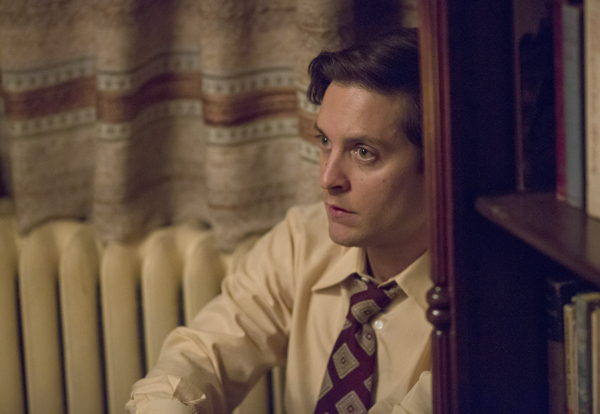![]() Pawn Sacrifice is a love story unlike any other, as it is a love between a man, chess genius Bobby Fischer (Tobey Maguire), and silence.
Pawn Sacrifice is a love story unlike any other, as it is a love between a man, chess genius Bobby Fischer (Tobey Maguire), and silence.
Chess played at the grandmaster level requires stretching the human mind to its outermost limits, as matches have to be exhaustively prepared for, and there are more potential moves and countermoves than there are stars in the Milky Way galaxy. All external input, all sensory stimulation, costs Fischer precious time that could be spent focusing his mind. Seemingly harmless actions like a man coughing or a TV camera buzzing could shatter a month’s worth of concentrated focus. The true adversary in the story is not Fischer’s competitor, Soviet grandmaster Boris Spassky (Liev Schreiber), but a world deeply inhospitable to the fragility of genius.
Born in Brooklyn in 1943, Fischer was a child prodigy throughout the 1950s, winning national championships, but faded into an early semi-retirement in the mid-1960s. Pawn Sacrifice picks up around 1967 after it was clear the Vietnam War was going to be a permanent black mark on national morale and the government wanted to win any victories against communism that it could. Just as the 1980 Olympic hockey victory at Lake Placid was considered a huge win for the free capitalist West against the Soviets, the World Chess Championship of 1972 was a key battle in the ideological struggle of the Cold War.
Paul Marshall (Michael Stuhlbarg) is charged with corralling the idiosyncratic Fischer and getting him back on track to be a world champion, as the government knows he is America’s only chance to defeat the godlike Spassky. He recruits Father Bill Lombardy (Peter Sarsgaard), a former chess prodigy turned Catholic priest, who beat both Fischer and Spassky when they were young. Marshall knows he needs to have someone Fischer respects on his side if he wants to get through to him.
Once the trio is assembled, they head to California for a big tournament, where Spassky will be playing. Right away, Fischer demands better accommodations—he can’t be expected to properly prepare in a fleabag motel while Spassky is put up at the best place in town. After playing his first match, he demands that the audience be moved back five more feet. “They’re too close, I can smell their breath,” he says. “It’s almost like I can hear their thoughts. My thoughts need to be on the board.” The California scenes provide the film’s best sense of place, as it spends a good chunk of its running time there, while the rest is mostly montage, media blitzes, running around between hotels, airports, and tournaments.
Maguire plays Fischer as a mixture of ascetic, obsessive student of chess; old-school swaggering Brooklyn attitude; and spiraling paranoia, verging on delusion. The tricky thing was, the Soviets really were spying on him, since he was the only obstacle between them and global superiority in the most intellectual of games. They weren’t spying on him quite as much as he thought they were, but that is a hard distinction to make. Even Spassky, played by Schreiber as the embodiment of calm, cool, collected mastery, shows signs of stress and paranoia cracking his carefully crafted façade.
Pawn Sacrifice excels at showing how much of a curse it often is to be in a position like Fischer’s. He was perhaps the greatest chess player of all time, one of the most valuable weapons America had against the Soviets in the Cold War. The problem was that America didn’t know what it was asking of him to participate in these grandmaster games—he was playing at a level of perfection no one had ever achieved, and he needed his surroundings to be a certain way in order to accomplish what he was being asked to do.
The filmmakers wisely choose to focus on Fischer’s successful return to tournament circuit in the late sixties and early seventies, ending the film with the immortal Fischer vs. Spassky match of 1972, with particular emphasis on Game 6, which is considered the greatest game ever played. Given how Fischer shortly afterward spiraled into vagrancy and psychosis, before returning to face Spassky in a 1992 rematch and then falling deeper into vagrancy before his death in 2008, there was plenty of fodder for a big, showy biopic Oscar bait role for Maguire. But the film is more effective for focusing on the pinnacle of Fischer’s career, since it’s not a portrait of his entire life but a dramatization of his most important achievements.
Producing the best chess the world had ever seen in an imperfect world was a messy struggle, and the film does an effective job of getting viewers to understand a once mainstream figure pushed to the fringes, lifting him out of mystery and obscurity.







Leave A Comment